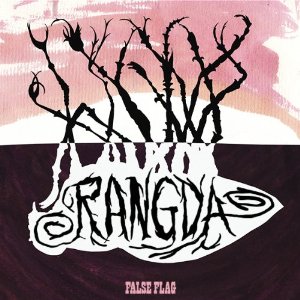If you, like I, have chanced upon the origin of the name Rangda while truffling for info about the damn heroes who took it for their band a year ago, apologies for dropping knowledge you probably had before me. In recompense, I’m pleased to tell you that Rangda the band have done justice to the character from Balinese mythology who eats children and leads a cabal of witches in their battle against benign goodness. They’ve also made a debut album that’s the sum of its parts, a towering achievement considering the parts in question. Richard Bishop of veteran global-minded experimentalists Sun City Girls initially began batting ideas to and fro with Ben Chasny of Six Organs Of Admittance, Comets On Fire, Will Oldham’s touring band and a stack more; presently, breathtaking and notably Bjork-hired avant-garde drummer Chris Corsano joined the fold. As no supergroup in history has ever wanted to be called a supergroup, I shall honour Rangda’s probable wishes, while noting that folks who like one of these three folks will likely dig the other two. Certainly on False Flag, a largely improvised album, they play to and feed off each other’s strengths and visions.
RANGDA – Bull Lore by butilikeyouIt begins imposingly. Only two minutes and fourteen seconds long, ‘Waldorf Hysteria’ is a a deliberate cacophony, and something of a red herring at that insofar as False Flag often steps back from aural tantrums like this one over the next 40 minutes. But it doesn’t sound like an idle brag of the "hey you lil’ indie-rock pigdog who only noticed this in the first place ’cause it’s on Drag City, and probably downloaded this fucking thing off Rapidshare anyway, we are from the NOISY LEFTFIELD and we are going to let you know this by CHALLENGING you" sort. The signature styles of each member can be heard amidst the squall: Bishop’s slow-cooking thrall for Middle Eastern guitar music and its rapidfire twang; Chasny’s whammy bar-savaging psychedelic freeness and Corsano’s impossibly loose and intuitive percussive philosophy, which sometimes seems like he might have watched a drummers’ tuition DVD and resolved to do the exact opposite of everything it advises.
Corsano and – I’m guessing – Chasny conspire to detonate bombs of noise at regular intervals throughout ‘Bull Lore’, ones which actually sound like nearer-than-you’d-wish rolls of thunder. The obligatory lightning is provided by a dominant guitar performance which starts off slow and imposing like Neil Young imbued with the grease of moustachioed, Grand Funk-ian hard rock, and evolves/devolves (a case could be made for either) into a blaze of skree-spattered glory along the lines of Japanese cult ritualists like Keiji Haino’s Fushitsusha and Musica Transonic. Conversely, there is little that could reasonably qualify as a riff on the following ‘Fist Family’ (a pun, not a typo) – this is where Corsano is thrust into the spotlight, his substantial free jazz influence a key element to a fearsome showcase of tom destruction and slashing cymbals. Behind him, guitars wail in the wind: industrial in their imposing greyness, almost literally metallic in their cyclical drilling.
Least likely of these six tracks to scare the horses, or square housemates or whichever other unsuspecting party, the five-minute ‘Sarcophagi’ (a Greek term meaning stone coffins) meanders mournfully, the kind of slow-melting electric blues instrumental that Chasny has near-perfected in Six Organs. Corsano is demoted to a more shadowy role – that said, a not unimportant one, his considered brushwork and minimalist tubthumping giving the spidery guitar an uneasy backdrop. Its position next to ‘Serrated Edges’, the penultimate number, serves to highlight the extremes of both tracks. ‘Serrated Edges’ is not False Flag‘s definitive piece, if only because it isn’t its best piece – it is, however, the one that covers the most ground, geographically and temporally. Where most would have struggled to locate much commonality between the Middle Eastern virtuoso string musicians who were documented on shellac eighty to ninety years back, and the last two or three decades of misanthropically loud guitar noisicians (Matthew Bower, Gary Mundy, the aforementioned Haino), Rangda act like it’s thuddingly obvious. The fact that all three appeared on the excellent Open Strings compilation – one CD of Middle Eastern archivism, one of contemporary ‘responses’ to it – last year lets you know that their interest in this era is active, but you’ll likely be unprepared for the dense fog of frantic picking and feedback churn that dominates.
In a move befitting the supergroup as she is often regarded – indulgent and peacocky, basically – the final song, ‘Plain Of Jars’, is by some distance the longest, stretching past the quarter-hour mark. Again faintly tinged with the cranky stamp of Neil Young, or Neil Young if he had a jones for Eastern scales, it wanders all over the swamp through thick tangles of blues, before settling into a repeated, chiming riff about nine and a half minutes in. Less intense than much of what precedes it, it’s as close as False Flag gets to ‘catchy’; either way, though, it rounds off a dudless opus that stands as one of the finest bolts 2010 has shot at us so far.


